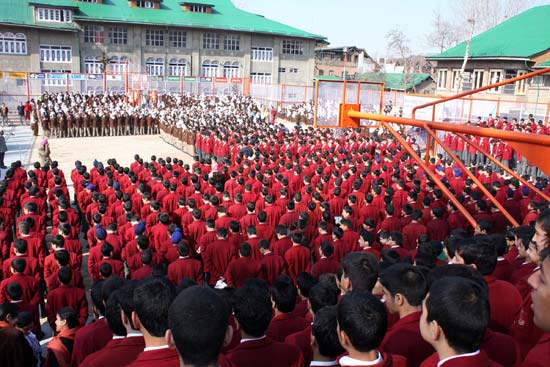by Riyaz Wani
The charges extracted from the students should be in direct proportion to the quality of the services rendered and to the extent facilities of an institution are used by them, not because a student happens to be admitted to a school.

The successive lockdowns since the revocation of Article 370 on August 5, 2019, have battered Kashmir’s economy. Almost all sectors have been hit hard. The Valley’s business bodies have pegged the loss upwards of Rs 50,000 crore. But if there is any sector that has more or less been insulated against this loss, it is private education. The private schools have been closed for one and a half year but they have largely collected their tuition fees, sometimes blackmailing the parents into paying up by withholding results of the sham examinations held now and then or through some other cheap tactic.
What is more, in many cases, the parents have even been forced to shell out half the transportation fees. And while all this is being done, many teachers have been fired, drivers have been shown the door and the salaries of those who have been retained have been halved or delayed. That too, at a time when the logistical cost of running a school has come down to zero.
16 Month Lockdown
It is true that many parents may not be paying in time as a result of the economic difficulties triggered by sixteen months of uninterrupted lockdown. But that hardly means they will not pay in near future or will not be forced to do so.
How does one deal with such a situation? It is time the government intervenes in the matter. And to start with, hold an audit of the finances of these institutions as the then Principal Secretary (Education), Asghar Samoon had sought to do last year. This will certainly clear the air as to the ability of these schools to pay to their staff. Samoon had made the decision in the wake of the complaints about non-payment of salaries to the teachers in these institutions.
As things stand, the private schools in Kashmir have created a business model that is least affected by any disruption to the economy. No matter what happens to people, whether they live or die or lose livelihoods, they charge their fees and as is the case now also fire their staff to make the most of the worst times.

True, not being able to teach normally in the prevailing situation is not the fault of these schools, but so is it not the fault of the hundreds of other businesses which have badly suffered because of the lingering turmoil. And if these businesses have taken their losses on the chin, so should private schools. In Tamil Nadu, the state government has asked private schools to just charge 70 per cent of the tuition fees. It is time the local administration passes a similar order here.
It is nobody’s case that private schools shouldn’t get their fees. They depend on the fees to run their affairs and to pay their staff. But it is also true that other than a brief period of a fortnight or so, the schools have been shut for around two years. And during this prolonged closure, they have saved on all the expenditures other than the salary of their staff, which too, some reports have pointed out, has often been delayed or reduced.
Blackmail
No doubt, their teachers have delivered online lectures and which too haven’t been up to the mark considering the curbs on the internet and the lack of the training of their staff to deliver such classes. So, the schools can’t charge full tuition fees, let alone transportation fees for a service they have largely been unable to offer. Or resort to blackmail to extract it like some elite schools are doing. Some of these schools held online exams and didn’t allow students to appear unless their parents paid up. And to top it all, they also fired some of their staff. It is thus time that the government holds them to account.
At the same time for the service the private schools charge hefty amounts of tuition, transportation and annual fees is now available online at a few thousand rupees from ed-tech companies which hire the best teachers and also offer graphic videos explaining the basics of a topic. Were the government to empower these companies to issue academic certificates, the private schools will become places for owls to live.
Commercial Entities
The point is that private schools have become more about business than education. The past two decades have witnessed the phenomenal growth of these schools in Kashmir. They have sprouted all over the place, from deep into the countryside to the congested urban areas, even in lanes and by-lanes. And then there are elite schools which boast of some imposing infrastructure, some even swimming pools, but that is that.

From the looks of it, a predominant part of the private school enterprise in Valley is more about running an unimaginative business than the delivery of quality education. And they get away with this easily because a majority of the parents in Kashmir don’t hold them to account or aren’t really bothered about good education. In a private school, they take the quality of education for granted. But sooner or later, the disruptive nature of the new education technology will force the physical schools to mend their ways.

It is also the time that the Kashmir private schools should earn their fees. The charges extracted from the students should be in direct proportion to the quality of the services rendered and to the extent facilities of an institution are used by them, not because a student happens to be admitted to a school.















